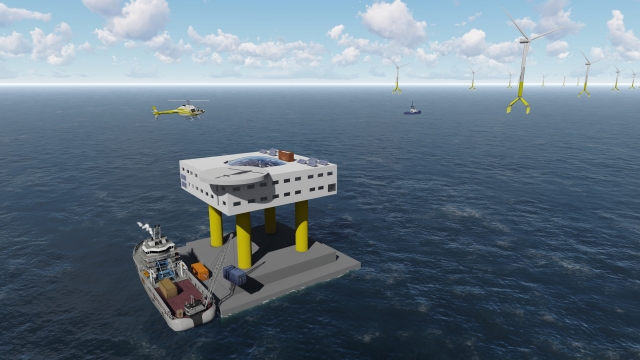Draft Design and Energy Supply for Housing Units Completed

Horizon 2020 project Space @Sea partners GICON and the University of Rostock have implemented an important focus of the project with the concept design of a living and working hub and a self-sufficient energy supply system
Dr. Frank Adam, Space@Sea representative for GICON and the University of Rostock, is satisfied with the progress of work for the development of an operation & maintenance platform and the development of a power storage system. The report was handed over in June. "We have comprehensively worked on the tasks assigned to us and are well ahead of the calculated schedule for implementation. This now gives us the security to stringently evaluate all possible solutions, which is needed for the subsequent detailed engineering phase".
Basic engineering for Energy Maintenance Hub complete
Dr. Adam's team worked on the design of an operation & maintenance platform for the maintenance workers of floating wind farms. The main focus was on a structure that enables a smooth workflow and a home-like feel for residents. "The two-level platform will be built on four columns, which in turn will be installed on a floating substructure. The working and living rooms offer space for approx. 32 people. The platform is rounded off by a green inner courtyard flooded with light," explains Adam. The main role of the hub will be to meet the ever-increasing maintenance requirements for offshore wind farms – especially farms away from shore are benefitting from the daily opportunity to ship personal up and down from the site starting at the operation & maintenance platform. In the future, on-site maintenance is important, with a view to storing spare parts and fuel reserves and reducing costs of ship and helicopter transfers.
Independent supply thanks to renewable energies
"We have to make the islands self-sufficient, free from fossil-derived raw material supplies", says engineer Falk Wittmann from GICON. "For this reason we have exclusively focused on renewable energy to provide the necessary electricity, heating, cooling and fresh water requirements of the residential and working hubs". The concept envisages that electricity, for example, is generated by a wind power plant, solar arrays or wave generators. Heat for heating the workrooms is to be produced by heat pumps, because especially in this case, free ambient heat is constantly available at a comparatively constant temperature level from the ocean water, which is everywhere around us. According to the concept, it is proposed to recycle the water used for fresh water production. The excess energy is consistently stored with the help of battery storage for later use. "In the first step, we recorded all the necessary data and, using floor plans and other parameters, simulated the energy requirement of the hub using a tool we had developed ourselves. Subsequently, the behavior of the energy system was simulated on the basis of special software.”, says Wittmann. Two deployment scenarios, one in the Mediterranean Sea and one in the North Sea, were discussed.
After basic engineering comes detailed engineering
With the completion, the detailed work in the project now begins. "We will now begin with the detailed engineering of the residential and working hub and thus achieve an important step in the preparation for planned tank tests in the coming year," says Dr. Frank Adam.

